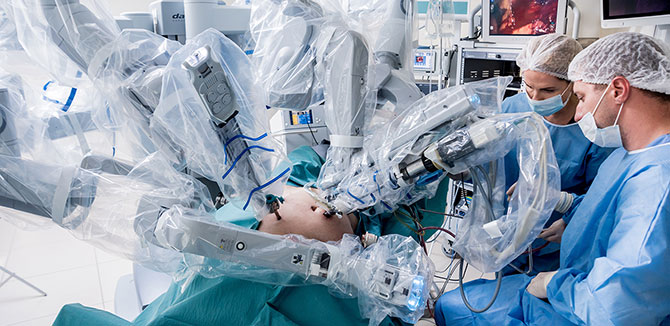Roboticists' Role in Healthcare and Medicine
As robotic systems are becoming more common in hospitals across the country, so too is the need for roboticists who understand those systems and can use robotics to make a difference.
Robotics are increasingly being used in new ways within the medical and health fields, from surgical robots and exoskeletons to rehabilitation robotics and ones used for remote monitoring and diagnosis. As the usage increases, so does the need for roboticists who can collaborate with healthcare professionals to drive further innovation in the field.
That is why Northwestern Engineering's Master of Science in Robotics (MSR) program highlighted medicine and healthcare as an industry that will continue to rely on the skills and knowledge developed by MSR students.
"The medical field is a meaningful industry for roboticists to work in because the work they do can have a tangible impact on a patient," said Matthew Elwin, co-director of Northwestern Engineering's Master of Science in Robotics (MSR) program. "It requires the robotics engineer to work with health care professionals to ensure that they are solving the right problems in a way that is practical in a healthcare setting. The focus on improving the lives of patients and healthcare teams makes the impact of this area clear and rewarding."

Lauren Hutson (MSR '18) saw that impact firsthand as a robotic software engineer at Diligent Robotics. The company's robots are designed to support and empower patient care teams, and Hutson helped design and maintain the core features of Moxi, the company's first robot attendant.
She felt the public gained a better understanding during the early months of the COVID-19 pandemic of how robots could provide assistance outside of surgeries.
"Hospitals can no longer spare any staff time on non-critical tasks," said Hutson, who now works as a software engineer at GE Healthcare. "Robots became a hot commodity for the amount of time saving they could provide for the staff as well as for the safety aspect of reducing contact and any inter-hospital spread of COVID-19."
Understanding how robotics could be used to help others is what drew Mahdieh Nejati Javaremi (MSR '15) to MSR. She wanted to build on her passion for assisted robotics, and she found a way to do that during and after her time in the program.
As a student in MSR, Javaremi began working on a smart wheelchair. Today she continues to focus on how robotics can help patients as a graduate research assistant at the Shirley Ryan Ability Lab.
"A lot of the program is structured, but it is designed to give you the freedom to carve out your own specialization," she said. "It was a great experience, and it gave me a lot of skills that made my PhD a little easier."
Devesh Bhura (MSR '22) also found that freedom to specialize was refreshing. Unsure of what industry he wants to work in professionally, Bhura spent his summer interning at Johnson & Johnson Medtech, where he helped develop a safety mechanism that senses errors during robot-assisted surgery.
"If the robot's actions start going wrong, it can be detected and stopped immediately," Bhura said. "That's a very important part of a medical device. Without the safety checks in place, it cannot be deployed on live patients."
The use of robotics in medical treatment and research has come a long way in not a lot of time, and the growing prevalence of robotics in the field will only increase with technological advances, including machine learning and artificial intelligence. Because of that, Elwin said the field is rife for someone looking to use their technological skills to make a difference.
"There remain many areas of medicine where improved robots may be able to help patients and providers," Elwin said. "To succeed, a robotics engineer not only needs to have the technical knowledge, but they also must understand what problems patients and healthcare workers face, how current robotics can help address those challenges, and what innovations are required to make robots even better at helping people in a healthcare setting."

